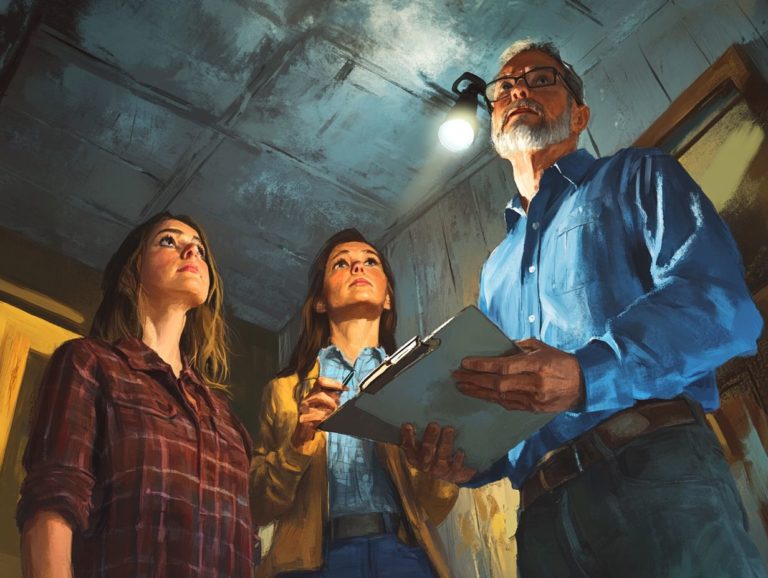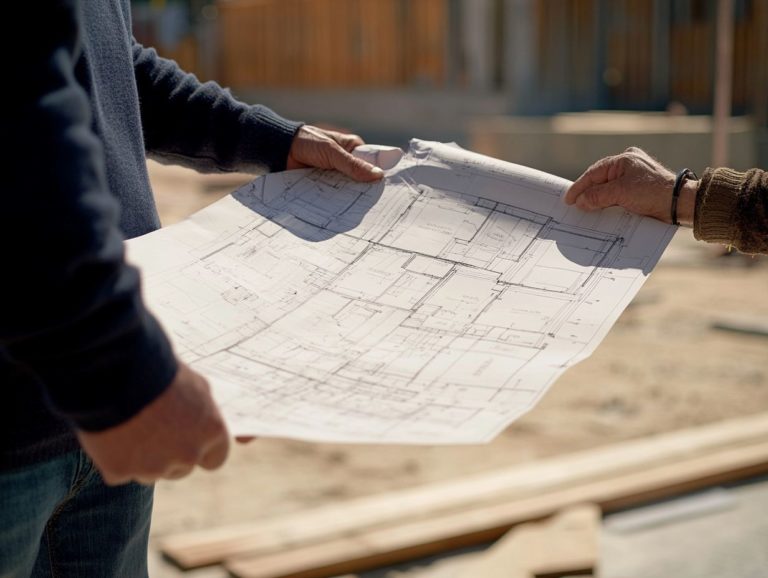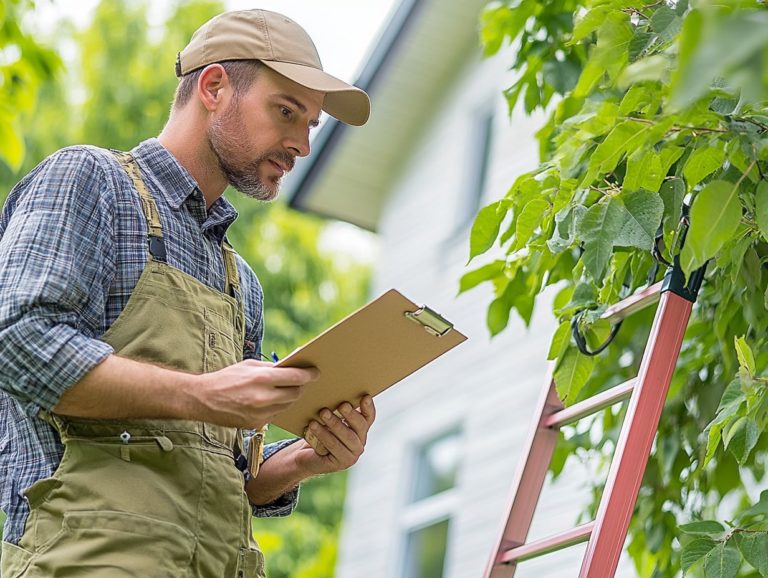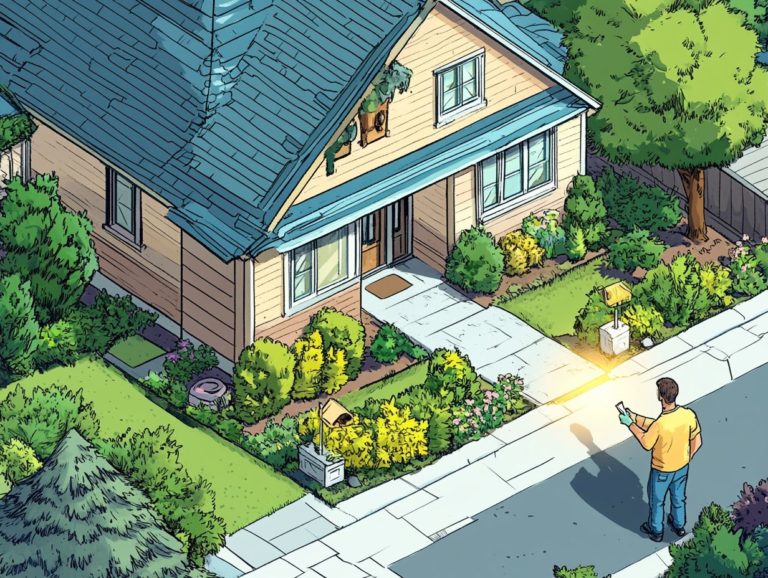What to Do After a Home Inspection
Navigating the home inspection process may seem daunting, but grasping what to expect will empower you as a buyer.
From decoding the inspection report to tackling major and minor issues, this guide will lead you through essential steps. You’ll discover how to negotiate effectively with sellers and make informed decisions that will shape your future home.
Whether you’re a first-time buyer or a seasoned homeowner, this article will arm you with the knowledge needed to confidently navigate the post-inspection landscape.
Contents
Key Takeaways:

Understanding the home inspection process is crucial for buyers to know what to expect and how to interpret the results.
Addressing major issues found during the inspection can involve negotiating with the seller or hiring professionals for repairs.
Making a decision and moving forward after the inspection means considering all findings and negotiating repairs or price reductions with the seller.
Understanding the Home Inspection Process
Understanding the home inspection process is essential whether you’re buying or selling in the real estate market. A home inspection involves a detailed examination of the property by a qualified inspector, resulting in a document that highlights potential concerns.
As a buyer, it’s critical to be aware of common repairs and maintenance tasks that might surface. If you’re selling, fixing these issues before listing can give you a significant advantage.
Being well-informed about what to expect can streamline negotiations and pave the way for a smoother closing experience.
What to Expect During a Home Inspection
During a home inspection, you can expect a thorough evaluation of the property s condition. The focus will be on crucial elements like safety concerns, electrical faults, plumbing issues, and structural integrity.
The process typically kicks off with a meticulous exterior examination. Inspectors assess everything from the roof to the landscaping and drainage systems.
Once inside, they ll check the functionality of appliances and heating and cooling systems to ensure everything operates safely and efficiently.
Pay close attention to the inspection report, as it will highlight critical repairs like water damage or pest infestations that could impact your investment.
If you’re selling, fix minor repairs beforehand to lead to smoother inspections. This approach enhances your home s appeal and marketability.
Interpreting the Inspection Report
Interpreting the inspection report is crucial whether you’re buying or selling a property. This document reveals the findings from the home inspection, pinpointing any significant issues that could impact the property’s value.
Knowing these details empowers you to make smart choices in your home buying journey!
Key Areas to Pay Attention to
- Focus on key areas, particularly major safety concerns and systems like heating and cooling, electrical, and plumbing that could lead to expensive repairs.
- A careful examination of the roof’s condition is vital; any signs of wear or leaks can result in serious water damage.
- Don t overlook the foundation cracks or settling can compromise the integrity of the entire structure.
- Inspect the basement for any signs of moisture or mold, as these issues can greatly affect both health and future renovation costs.
By prioritizing these elements, you ll be equipped to make informed decisions that protect your investment.
Addressing Major Issues

Addressing the significant issues highlighted in the inspection report is essential for preserving the property’s value. It also facilitates a seamless transaction between buyer and seller.
Options for Dealing with Major Problems
When you encounter significant issues highlighted in the inspection report, you have several effective options to address these concerns.
You might consider negotiating repair requests with the seller, working together to resolve any issues. Alternatively, arranging for repairs to be completed before closing can ensure the property is in excellent condition when ownership is transferred.
Another practical option is adjusting the sale price to account for the costs of necessary repairs. This straightforward solution aligns with both parties’ interests. Each of these routes presents its advantages, so weigh them carefully for a successful transaction.
Dealing with Minor Issues
Dealing with minor issues that emerge from a home inspection can be easy and rewarding!
Many of these concerns usually revolve around cosmetic repairs or maintenance tasks that you, as the homeowner, can address yourself or delegate to a skilled professional.
DIY Fixes and Hiring Professionals
For those minor repairs that pop up during a home inspection, you can either dive into some DIY fixes or call in professionals, depending on your skill level and the task’s complexity.
If you’re facing cosmetic issues like scuffed walls, outdated light fixtures, or small holes to patch, these tasks might be right up your alley if you enjoy a hands-on approach.
However, when you encounter a leaky faucet or a running toilet, it s crucial to decide if you have the plumbing knowledge to tackle such problems effectively. A licensed contractor, for example, is a professional with official approval to perform repairs.
While replacing a washer might be a simple fix you can handle, more intricate plumbing issues often require a contractor’s expertise. This ensures everything is done correctly and adheres to local codes.
By recognizing these distinctions, you can save valuable time and money while keeping your home in excellent condition.
Negotiating with the Seller
Negotiating with the seller using insights from the inspection report can significantly influence the outcome of the real estate transaction for both parties.
Your ability to leverage these findings can help create a better agreement, ensuring that both buyer and seller feel satisfied with the resolution.
Tips for Negotiating Repairs or Price Reduction

To negotiate repairs or a price reduction successfully, gather evidence from the inspection report and gain insight into the seller’s perspective.
With this information, you can approach negotiations with confidence, emphasizing the issues that need attention while also recognizing the seller’s position.
Offering to cover some closing costs can be an attractive proposition, showcasing your goodwill and flexibility.
Suggesting a credit offer instead of repairs can be a practical solution for both parties, easing immediate concerns for you while allowing the seller to close the deal smoothly.
By maintaining open communication and focusing on collaborative problem-solving, you can significantly enhance your chances of achieving a favorable outcome.
Moving Forward After the Inspection
Moving forward after the home inspection is crucial for both buyers and sellers. Understanding what to expect during a home inspection is essential, as this phase demands careful consideration and decision-making based on the insights in the inspection report.
Making a Decision and Closing the Deal
Making a decision after the inspection and effectively closing the deal requires careful consideration of the home inspection report, necessary repairs, and negotiations.
As a homebuyer, it s essential to review the inspection report to pinpoint critical issues needing attention.
Once you understand the findings, you can enter final negotiations with the seller, aiming for agreements on repairs, price adjustments, or credits to address those items.
Maintaining open communication is vital, ensuring everyone is aligned on expectations.
Before moving forward to closing, ensure that any agreed-upon terms are documented in writing. This protects your interests and paves the way for a smoother transition into homeownership.
Frequently Asked Questions
In summary, addressing issues from a home inspection involves effective strategies for negotiation, understanding whether to DIY or hire professionals, and making informed decisions going forward. By keeping communication open and being proactive, you can navigate these challenges successfully.
What should I do after a home inspection?
Review the report and talk to the seller about any major issues. Consider getting a second opinion from a trusted contractor.
Do I need to negotiate after a home inspection?

It’s common to negotiate after a home inspection, especially if significant issues are found. Discuss repairs or credits with the seller to reach a fair agreement.
Can I request repairs after a home inspection?
Yes, you can ask for repairs after a home inspection. However, whether the seller agrees depends on their willingness.
What happens if the home inspection reveals major issues?
If major issues are found, you have options. You can negotiate, walk away from the deal, or ask the seller to make repairs before closing.
Is it necessary to attend the home inspection?
It s not mandatory, but attending is highly recommended. You can ask questions and see any issues firsthand.
Can I back out of a home purchase after a home inspection?
Yes, you can back out, but it depends on your contract terms. Consult with your real estate agent or lawyer before deciding.






